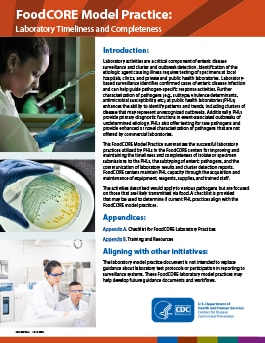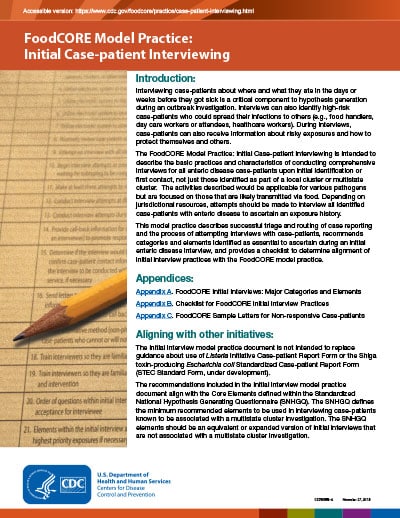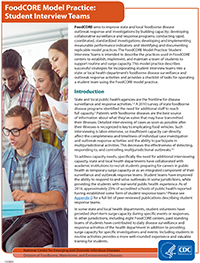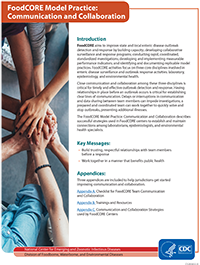Model Practices
Building on their strong surveillance and response programs, FoodCORE centers work together to develop model practices for outbreak response. They do this so that others can learn from their experiences and replicate what works best. There is a lot of variability in the states that are part of FoodCORE, so practices that work across all of their systems will likely work in other states too.
The FoodCORE Model Practice: Laboratory Timeliness and Completeness summarizes the successful laboratory practices utilized by public health laboratories (PHLs) in the FoodCORE centers for improving and maintaining the timeliness and completeness of isolate or specimen submissions to the PHLs, the subtyping of enteric pathogens, and the communication of laboratory results and cluster detection reports.
The activities described would apply to various pathogens but are focused on those that are likely transmitted via food. A checklist is provided that may be used to determine if current PHL practices align with the FoodCORE model practices.
Interviewing case-patients about where and what they ate in the days or weeks before they got sick is a critical component to hypothesis generation during an outbreak investigation. Interviews can also identify high-risk case-patients who could spread their infections to others (e.g., food handlers, day care workers or attendees, healthcare workers). During interviews, case-patients can also receive information about risky exposures and how to protect themselves and others.
The FoodCORE Model Practice: Initial Case-patient Interviewing is intended to describe the basic practices and characteristics of conducting comprehensive interviews for all enteric disease case-patients upon initial identification or first contact, not just those identified as part of a local cluster or multistate cluster. The activities described would be applicable for various pathogens but are focused on those that are likely transmitted via food. Depending on jurisdictional resources, attempts should be made to interview all identified case -patients with enteric disease to ascertain an exposure history.
This model practice describes successful triage and routing of case reporting and the process of attempting interviews with case-patients, recommends categories and elements identified as essential to ascertain during an initial enteric disease interview, and provides a checklist to determine alignment of initial interview practices with the FoodCORE model practice.
The FoodCORE Model Practice: Student Interview Teams is intended to describe the practices used in FoodCORE centers to establish, implement, and maintain a team of students to support routine and surge capacity. This model practice describes successful strategies for incorporating student interview teams into a state or local health department’s foodborne disease surveillance and outbreak response activities and provides a checklist of tasks for operating a student team using the FoodCORE model practice.
Additional Resources:
- Download Print only: Student Internet Teams – Executive Summary [PDF – 2 pages]
- Benefits of Student Teams Infographic | Download print version [PDF – 1 page]
- Building a Successful Student Team Infographic | Download print version [PDF – 1 page]
- Student Team Recruitment Flyer | Download print version [PDF – 1 page]
Close communication and collaboration among these three disciplines is critical for timely and effective outbreak detection and response. Having relationships in place before an outbreak occurs is critical for establishing clear lines of communication. Delays or interruptions in communication and data sharing between team members can impede investigations; a prepared and coordinated team can work together to quickly solve and stop outbreaks, preventing additional illnesses.
The FoodCORE Model Practice: Communication and Collaboration describes successful strategies used in FoodCORE centers to establish and maintain connections among laboratorians, epidemiologists, and environmental health specialists.
Additional Resources:



